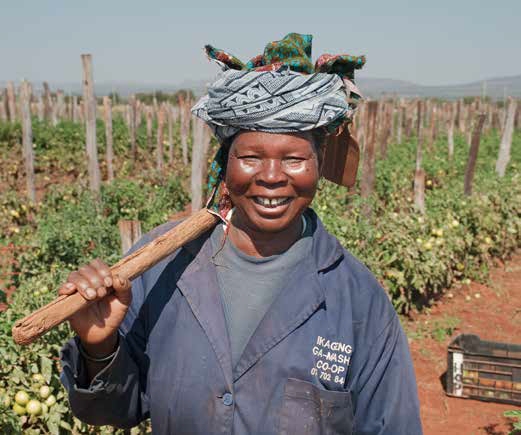The search for better ways to connect smallholder farmers, government and agribusiness

Mounting evidence leaves little doubt about the enormous need and potential for investment in irrigated small-scale farming across sub-Saharan Africa. Not so clear is what mode of farming is most apt for realizing this potential in ways that are equitable and sustainable. In the search for solutions, South Africa’s breadth of experience is especially instructive, offering lessons and insights that are relevant to the whole region.
As part of an effort to examine diverse alternatives, the South African Department of Agriculture, Forestry and Fisheries (DAFF) commissioned the International Water management Institute (IWMI) to carry out a close analysis of the Flag Boshielo Irrigation Scheme along the Olifants River in Limpopo Province, which encompasses large areas of the former homelands. The purpose of this research, which contributed importantly to the CGIAR Research Program on Water, Land and Ecosystems (WLE), was to determine in detail what did and did not work, and why. Its results are presented in a new publication titled Joint ventures in the Flag Boshielo Irrigation Scheme, South Africa: A history of smallholders, states and business (IWMI Research Report 171).
In South Africa and other countries of the region, agribusinesses have entered rural areas where smallholder farmers predominate, offering to provide capital, technology and training that would otherwise be lacking. The idea is that, by boosting productivity and achieving economies of scale, the corporate sector can achieve more progress than governments have so far in kick-starting broad-based agricultural development. Among the expected benefits are quicker transfer of technology to smallholders, better jobs for youth and increased foreign exchange.
This approach has taken various forms, involving different configurations of agribusiness, government and smallholders. They range from the estate mode at one end of the continuum, which reduces local people to the status of laborers on their ancestral lands, to contract farming at the other end, in which smallholder out-growers keep their land and manage production, with inputs, extension services and market access provided under contract by agribusiness.
Somewhere between these extremes is the joint venture model. While smallholders supply land and labor, a so-called “strategic partner” manages production (typically mechanized), supplies inputs and handles marketing. Smallholders and their partner share the net profits. Since the end of the apartheid system in 1994, South Africa has experimented with this model on large-scale farms that were redistributed to farmers under land reform as well as through smallholder irrigation schemes in the former homelands. Results with the latter have been decidedly mixed, and critiques of these experiences have usefully informed the government’s efforts to put smallholder farming on a solid and sustainable footing.
The six joint ventures that IWMI researchers examined formed part of a provincial government program called RESIS-Recharge (Revitalization of Smallholder Irrigation Schemes). Based on a literature review and extensive interviews carried out over more than a decade, the researchers found that smallholders did not benefit from the program. Despite having little say in production decisions, they absorbed much of the risk of crop and income losses, including those associated with the adoption of a new and untested irrigation system. Since production was heavily mechanized, it offered them few jobs. Conflicts arose over these and other shortcomings, including a lack of transparency about the share of profits due to smallholders. As a result, three of the joint ventures collapsed; two others chose a new strategic partner; and the remaining one ground to a halt over land tenure conflicts.
The IWMI/WLE findings reaffirm new government policies, including the 2015 irrigation strategy, which emphasize farmer participation in irrigation development and full respect for their concerns and preferences. Under this policy, joint ventures remain an option but only under certain conditions, such as transparent contracts between smallholders and a strategic partner of their choosing, in which risks are shared and farmers gain real access to inputs, technologies, employment and markets. Other measures called for are to strengthen farmers’ land rights and promote diverse options – including out-grower arrangements and land leasing as well as production and marketing managed by smallholders.

